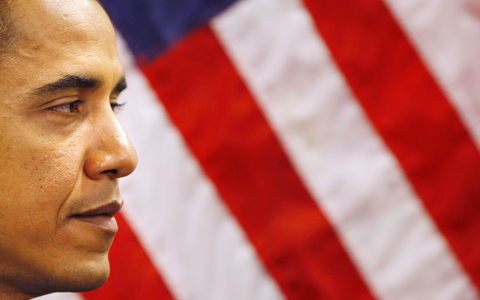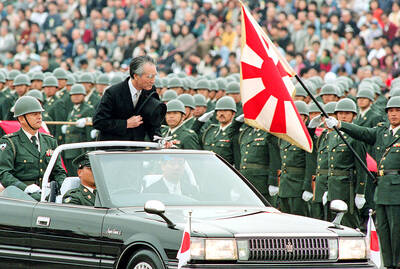US president-elect Barack Obama’s dedication to addressing climate change will be tested on his first day in the White House, where a few strokes of the pen could radically change Bush administration policies. Obama takes office on Tuesday in the midst of an economic crisis, and he will have to build a consensus to effect broad change. But some major actions — and symbolic ones — are solely at his discretion.
“He should find Jimmy Carter’s solar panels, wherever Ronald Reagan threw them, and put them back up on the White House, because they probably still work,” said Danny Kennedy, president of San Francisco Bay Area solar installer Sungevity.
There are plenty of other public buildings to upgrade, said David Doniger, climate center policy director at the Natural Resources Defense Council.

PHOTO: AP
Obama could change, for instance, government procurement policies as soon as he is in office — from buying more alternative energy power to weatherizing federal buildings.
But the biggest focus by environmentalists is on allowing California and some 19 other states to begin regulating carbon pollution from cars to address global warming. California said that its proposed standards would reduce greenhouse gases considerably.
“Everything hinges on the approval for California. Once it’s approved for California, it takes place everywhere else,” Doniger said.
The US Environmental Protection Agency has turned down the request to regulate carbon by the most populous state. Obama, however, can direct the agency to reverse course.
That is one of four Day One issues lobbied for by the Sierra Club. The nature group also wants the government to begin regulating carbon emissions from power plants — the Supreme Court said the EPA could regulate greenhouse gases as pollutants, but the agency has not.
In addition, Obama should get the EPA to use the Clean Water Act to slow mountaintop-removal coal mining and set a target for US carbon dioxide reduction — 35 percent by 2020, the club said.
“None of them get in the way of any challenges he faces right now: None of them will slow down the creation of new jobs, none of them will exacerbate the federal deficit. They all require him to draw a sharper line between the Bush past and the Obama future,” Sierra Club executive director Carl Pope said.
He predicted Obama would do about half the wish list in the first two or three weeks.
Washington lawyer Peter Wyckoff, a partner specializing in environmental law at Pillsbury Winthrop, said Obama could take dramatic action by ordering the EPA to develop a national plan to regulate carbon emissions that contribute to global warming.
The Clean Air Act gives the EPA latitude to create a carbon trading system, like the one used in Europe. Supporters of the idea saw it as a way to nudge Congress.
“The Obama administration in their view should put this in place in proposed form so as to create a sword, if you will, over the head of Congress to create Congress’s own program,” Wyckoff said.

The Venezuelan government on Monday said that it would close its embassies in Norway and Australia, and open new ones in Burkina Faso and Zimbabwe in a restructuring of its foreign service, after weeks of growing tensions with the US. The closures are part of the “strategic reassignation of resources,” Venezueland President Nicolas Maduro’s government said in a statement, adding that consular services to Venezuelans in Norway and Australia would be provided by diplomatic missions, with details to be shared in the coming days. The Norwegian Ministry of Foreign Affairs said that it had received notice of the embassy closure, but no

A missing fingertip offers a clue to Mako Nishimura’s criminal past as one of Japan’s few female yakuza, but after clawing her way out of the underworld, she now spends her days helping other retired gangsters reintegrate into society. The multibillion-dollar yakuza organized crime network has long ruled over Japan’s drug rings, illicit gambling dens and sex trade. In the past few years, the empire has started to crumble as members have dwindled and laws targeting mafia are tightened. An intensifying police crackdown has shrunk yakuza forces nationwide, with their numbers dipping below 20,000 last year for the first time since records

EXTRADITION FEARS: The legislative changes come five years after a treaty was suspended in response to the territory’s crackdown on democracy advocates Exiled Hong Kong dissidents said they fear UK government plans to restart some extraditions with the territory could put them in greater danger, adding that Hong Kong authorities would use any pretext to pursue them. An amendment to UK extradition laws was passed on Tuesday. It came more than five years after the UK and several other countries suspended extradition treaties with Hong Kong in response to a government crackdown on the democracy movement and its imposition of a National Security Law. The British Home Office said that the suspension of the treaty made all extraditions with Hong Kong impossible “even if

Former Japanese prime minister Tomiichi Murayama, best known for making a statement apologizing over World War II, died yesterday aged 101, officials said. Murayama in 1995 expressed “deep remorse” over the country’s atrocities in Asia. The statement became a benchmark for Tokyo’s subsequent apologies over World War II. “Tomiichi Murayama, the father of Japanese politics, passed away today at 11:28am at a hospital in Oita City at the age of 101,” Social Democratic Party Chairwoman Mizuho Fukushima said. Party Secretary-General Hiroyuki Takano said he had been informed that the former prime minister died of old age. In the landmark statement in August 1995, Murayama said